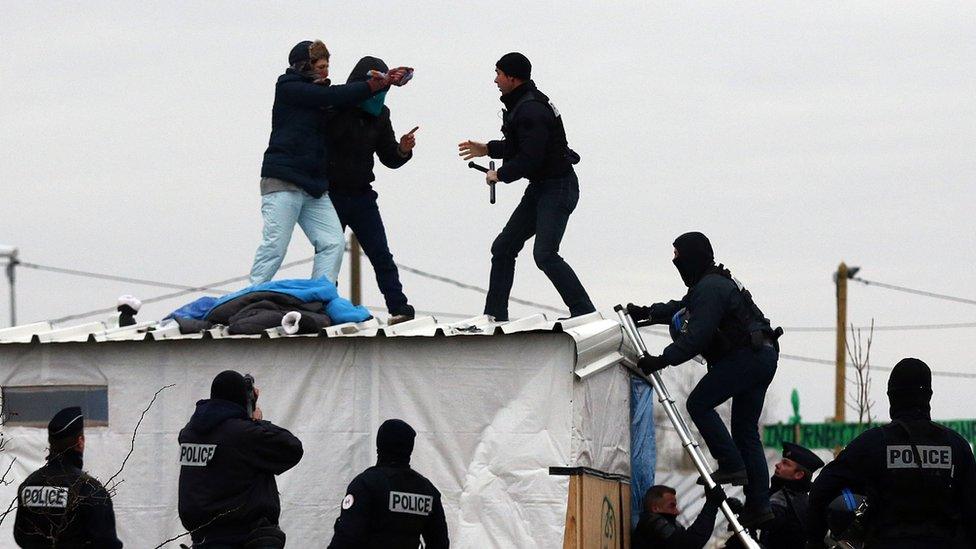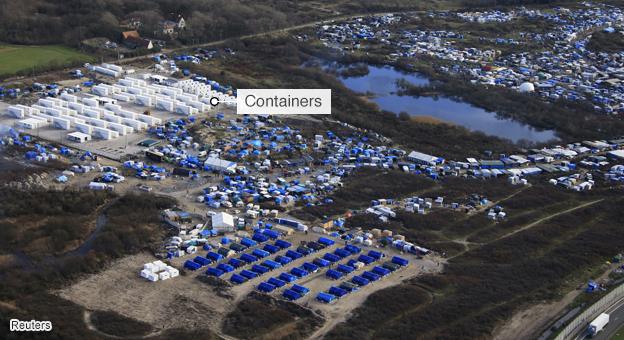EU migrant crisis: Calais 'Jungle' clearance work resumes
- Published
"Samir" says the demolition makes him feel "not human"
Demolition teams have been dismantling more makeshift shelters in the migrant camp known as the "Jungle" in the French port of Calais.
They met little resistance in contrast to Monday, when there were clashes.
French police have warned that they will use force if the migrants refuse to move to nearby shipping containers.
But many migrants fear they will be required to claim asylum in France and give up hope of travelling to Britain.
French authorities believe about 1,000 migrants will be affected by the eviction plan while aid agencies say the number of people living there is much higher.
On Tuesday, riot police entered the camp with shields, batons, helmets and tear gas - prepared for trouble, but meeting little resistance, reports the BBC's Anna Holligan in Calais.
They were followed by bulldozers, which cleared away wooden pallets, blankets and debris.
Those living in the camp, mainly from the Middle East, Afghanistan and Africa, hope to cross the Channel to the UK, often using people traffickers to try to enter illegally.
About 100 shacks were dismantled on Monday. At least 12 shelters were set ablaze.

'Borders of pain' - media analysis by BBC Monitoring
In France, the camp clearance is generally not on the front pages, although regional daily La Voix du Nord is headlined "Jungle set ablaze".
National paper Le Figaro has a feature, external on migrants who are so fed up with the life in the Jungle that they want to go home. "We're treated like animals. We're slowly dying," Afghan Nasrat says.
In Germany, the papers focus on Monday's storming of the Greek-Macedonian border and the continuing debate over Chancellor Angela Merkel's liberal migration policy.
"Europe's pain threshold," says a headline in Die Welt, using a word that also translates as "borders of pain".
"Athens loses control over refugees," says Sueddeutsche Zeitung, arguing in a in a commentary, external that the "suffering" on display in Greece vindicates Mrs Merkel's approach, while an article in the Frankfurter Allgemeine Zeitung, external believes Ms Merkel is failing to win over the other EU states and Turkey.
The story is also well covered in Russia, whose government - according to some - sees the refugee crisis as a way to sow division in the EU.

On Monday, under cover of darkness, migrants tried to access lorries on the motorway heading towards the port.
French media say about 150 people, some wielding sticks and iron bars, walked on to the road to block vehicles.
Riot police fired tear gas, forcing them back, our correspondent reports.

A woman threatened to cut her wrist as French police tried to remove her from the camp on Tuesday
In pictures: Anger as 'Jungle' cleared
At least four people, including activists from the UK-based No Borders group, were arrested during Monday's unrest, police say.
Earlier, Good Chance, a theatre group which works in the camp, said police were stopping volunteers from entering the camp.
French officials say public areas such as places of worship or schools will not be affected. They describe the clearance as a "humanitarian operation".
Conditions in the southern sector are squalid and the camp's sprawling presence has become a controversial issue in both France and the UK.

The Jungle in numbers

Total camp population is disputed - Calais officials say it houses 3,700, while Help Refugees puts it at 5,497
Figures for the southern half (facing immediate eviction threat) are estimated at either 800-1,000 or 3,455
There are 205 women and 651 children (423 unaccompanied), says Help Refugees
Local government's long-term aim is to have no more than 2,000 migrants living in Calais, says its chief, Fabienne Buccio

Officials say migrants can either move into converted containers in the northern sector of the camp, where there is room for 1,500 people; move to similar accommodation centres elsewhere in France; or claim asylum in France.
But many residents are reluctant to leave the Calais area.
Afghan migrant Hayat Sirat told AP news agency: "Going to Britain... is what people [here] want. So destroying part of the Jungle is not the solution."

Containers have been built to house some of the migrants

The authorities want to clear a section of the south area of the camp

Are you in the area? Have you been affected by the evictions? Email haveyoursay@bbc.co.uk, external with your stories if it is safe to do so.
Please include a contact number if you are willing to speak to a BBC journalist. You can also contact us in the following ways:
WhatsApp: +44 7525 900971
Send pictures/video to yourpics@bbc.co.uk, external
Tweet: @BBC_HaveYourSay, external
Send an SMS or MMS to 61124 or +44 7624 800 100